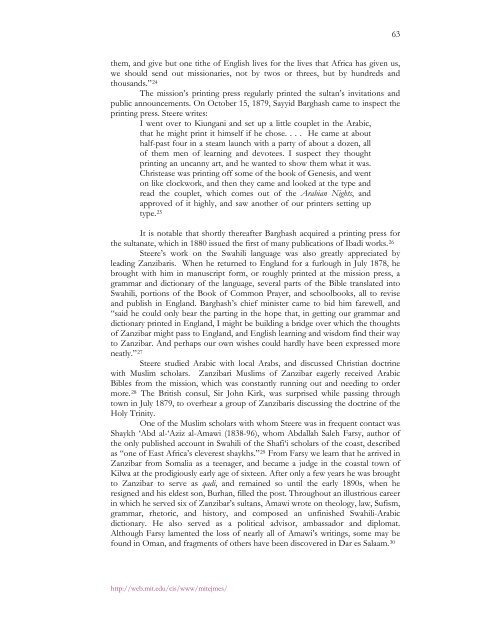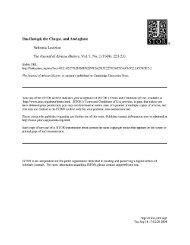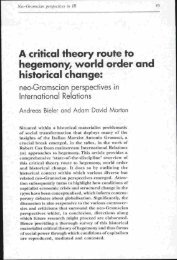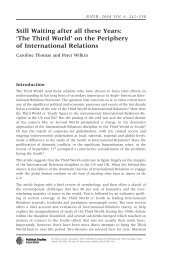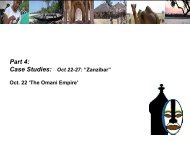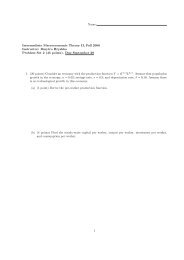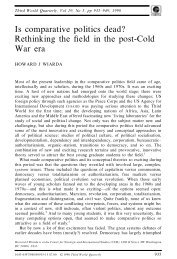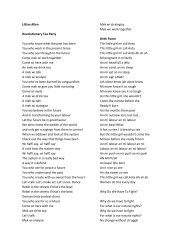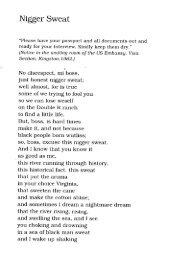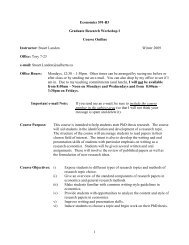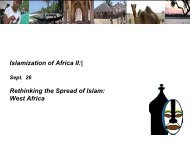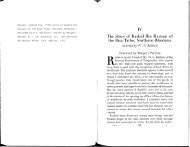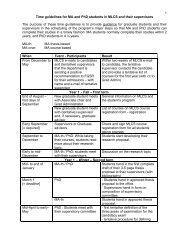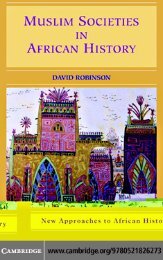personal memories revolutionary states and indian ocean migrations
personal memories revolutionary states and indian ocean migrations
personal memories revolutionary states and indian ocean migrations
You also want an ePaper? Increase the reach of your titles
YUMPU automatically turns print PDFs into web optimized ePapers that Google loves.
them, <strong>and</strong> give but one tithe of English lives for the lives that Africa has given us,<br />
we should send out missionaries, not by twos or threes, but by hundreds <strong>and</strong><br />
thous<strong>and</strong>s.” 24<br />
The mission’s printing press regularly printed the sultan’s invitations <strong>and</strong><br />
public announcements. On October 15, 1879, Sayyid Barghash came to inspect the<br />
printing press. Steere writes:<br />
I went over to Kiungani <strong>and</strong> set up a little couplet in the Arabic,<br />
that he might print it himself if he chose. . . . He came at about<br />
half-past four in a steam launch with a party of about a dozen, all<br />
of them men of learning <strong>and</strong> devotees. I suspect they thought<br />
printing an uncanny art, <strong>and</strong> he wanted to show them what it was.<br />
Christease was printing off some of the book of Genesis, <strong>and</strong> went<br />
on like clockwork, <strong>and</strong> then they came <strong>and</strong> looked at the type <strong>and</strong><br />
read the couplet, which comes out of the Arabian Nights, <strong>and</strong><br />
approved of it highly, <strong>and</strong> saw another of our printers setting up<br />
type. 25<br />
It is notable that shortly thereafter Barghash acquired a printing press for<br />
the sultanate, which in 1880 issued the first of many publications of Ibadi works. 26<br />
Steere’s work on the Swahili language was also greatly appreciated by<br />
leading Zanzibaris. When he returned to Engl<strong>and</strong> for a furlough in July 1878, he<br />
brought with him in manuscript form, or roughly printed at the mission press, a<br />
grammar <strong>and</strong> dictionary of the language, several parts of the Bible translated into<br />
Swahili, portions of the Book of Common Prayer, <strong>and</strong> schoolbooks, all to revise<br />
<strong>and</strong> publish in Engl<strong>and</strong>. Barghash’s chief minister came to bid him farewell, <strong>and</strong><br />
“said he could only bear the parting in the hope that, in getting our grammar <strong>and</strong><br />
dictionary printed in Engl<strong>and</strong>, I might be building a bridge over which the thoughts<br />
of Zanzibar might pass to Engl<strong>and</strong>, <strong>and</strong> English learning <strong>and</strong> wisdom find their way<br />
to Zanzibar. And perhaps our own wishes could hardly have been expressed more<br />
neatly.” 27<br />
Steere studied Arabic with local Arabs, <strong>and</strong> discussed Christian doctrine<br />
with Muslim scholars. Zanzibari Muslims of Zanzibar eagerly received Arabic<br />
Bibles from the mission, which was constantly running out <strong>and</strong> needing to order<br />
more. 28 The British consul, Sir John Kirk, was surprised while passing through<br />
town in July 1879, to overhear a group of Zanzibaris discussing the doctrine of the<br />
Holy Trinity.<br />
One of the Muslim scholars with whom Steere was in frequent contact was<br />
Shaykh ‘Abd al-‘Aziz al-Amawi (1838-96), whom Abdallah Saleh Farsy, author of<br />
the only published account in Swahili of the Shafi‘i scholars of the coast, described<br />
as “one of East Africa’s cleverest shaykhs.” 29 From Farsy we learn that he arrived in<br />
Zanzibar from Somalia as a teenager, <strong>and</strong> became a judge in the coastal town of<br />
Kilwa at the prodigiously early age of sixteen. After only a few years he was brought<br />
to Zanzibar to serve as qadi, <strong>and</strong> remained so until the early 1890s, when he<br />
resigned <strong>and</strong> his eldest son, Burhan, filled the post. Throughout an illustrious career<br />
in which he served six of Zanzibar’s sultans, Amawi wrote on theology, law, Sufism,<br />
grammar, rhetoric, <strong>and</strong> history, <strong>and</strong> composed an unfinished Swahili-Arabic<br />
dictionary. He also served as a political advisor, ambassador <strong>and</strong> diplomat.<br />
Although Farsy lamented the loss of nearly all of Amawi’s writings, some may be<br />
found in Oman, <strong>and</strong> fragments of others have been discovered in Dar es Salaam. 30<br />
http://web.mit.edu/cis/www/mitejmes/<br />
63


